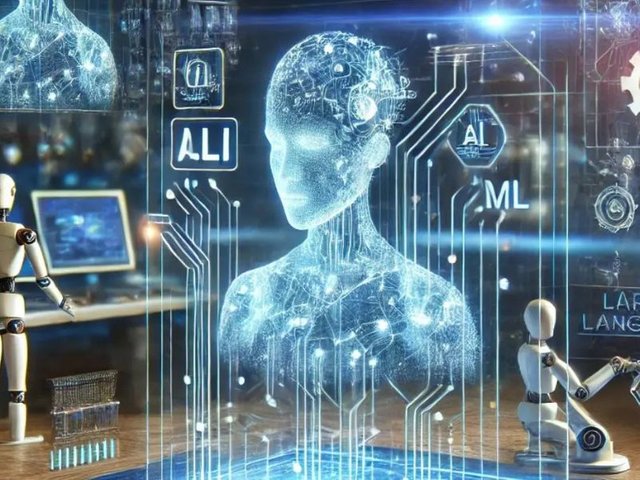What is AI Agent Development, and How Can It Transform Businesses in 2025?

Artificial Intelligence (AI) is no longer just a buzzword; it has become the cornerstone of innovation in businesses across industries. Among the groundbreaking advancements within AI is AI Agent Development, a transformative approach to building intelligent, autonomous systems capable of streamlining operations, enhancing customer experiences, and unlocking growth opportunities.
In this blog, we’ll explore what AI agent development is, its key components, and how businesses in 2025 can leverage it to stay ahead of the curve.
What is AI Agent Development?
AI agent development involves creating autonomous, intelligent systems—or “agents”—designed to perform specific tasks or functions on behalf of humans. These agents are powered by advanced machine learning models, natural language processing (NLP), computer vision, and decision-making algorithms. AI agents can interact with their environment, learn from data, and adapt to new scenarios, enabling them to operate without constant human intervention.
Types of AI Agents:
- Reactive Agents: Perform specific actions based on real-time stimuli. Example: Chatbots.
- Proactive Agents: Anticipate needs and make decisions autonomously. Example: Recommendation systems.
- Cognitive Agents: Mimic human-like reasoning and adapt dynamically. Example: Virtual assistants like ChatGPT integrated into workflows.
These agents vary in complexity and purpose, ranging from simple rule-based bots to highly sophisticated systems capable of self-learning and decision-making.
Key Components of AI Agent Development
1. Natural Language Processing (NLP):
AI agents often rely on NLP to understand and generate human language. This capability enables seamless communication, whether it’s customer support or real-time language translation.
2. Machine Learning (ML):
ML is the backbone of AI agents, allowing them to learn patterns, make predictions, and improve performance over time. It includes supervised, unsupervised, and reinforcement learning.
3. Computer Vision:
For agents that operate in visual environments, computer vision helps interpret images and videos. Applications include facial recognition, quality control in manufacturing, and autonomous vehicles.
4. Automation Frameworks:
AI agents are often integrated with automation tools to perform repetitive tasks efficiently, such as data entry, report generation, or email responses.
5. Cloud and Edge Computing:
Modern AI agents leverage cloud and edge computing for faster data processing and scalability. Cloud solutions enable large-scale computations, while edge computing supports real-time decision-making at local levels.
How AI Agent Development Can Transform Businesses in 2025
1. Enhanced Customer Experiences
AI agents in customer support are becoming increasingly intelligent. From personalized recommendations to resolving complex queries, AI-powered virtual assistants can handle a significant portion of customer interactions, ensuring 24/7 availability and higher satisfaction.
Use Case:
- E-commerce platforms utilize AI agents to provide tailored product suggestions, increasing customer retention and sales.
2. Operational Efficiency
AI agents can automate mundane, repetitive tasks, allowing employees to focus on more strategic initiatives. They also improve workflow management by identifying inefficiencies and suggesting optimizations.
Use Case:
- In logistics, AI agents manage inventory levels, optimize delivery routes, and reduce operational costs.
3. Data-Driven Decision Making
AI agents equipped with predictive analytics provide actionable insights from vast datasets, enabling businesses to make informed decisions faster.
Use Case:
- Financial firms use AI agents to analyze market trends and predict stock price movements, aiding investment strategies.
4. Workforce Augmentation
AI agents complement human capabilities by handling time-intensive tasks or performing tasks that require precision and speed. This allows companies to scale operations without proportionally increasing workforce costs.
Use Case:
- AI agents in the healthcare industry assist doctors by analyzing medical records and suggesting treatment plans.
5. Personalization at Scale
AI agents analyze individual preferences and deliver hyper-personalized services, fostering deeper connections with customers.
Use Case:
- Media streaming platforms like Netflix and Spotify deploy AI agents to curate content recommendations based on viewing or listening habits.
6. Innovation Through Creativity
Generative AI agents are transforming industries like content creation, design, and R&D by autonomously generating ideas, prototypes, and even entire products.
Use Case:
- In marketing, AI agents develop targeted ad campaigns, write personalized email content, and design promotional graphics.
Challenges in AI Agent Development
While the potential of AI agents is immense, businesses must address the following challenges:
- Data Privacy Concerns: Handling sensitive data requires robust security measures to avoid breaches.
- Ethical Implications: Ensuring fairness, transparency, and accountability in decision-making processes.
- Integration Complexities: AI agents must seamlessly integrate with existing systems and workflows.
- Skill Gap: Developing and managing AI agents requires specialized expertise that many businesses lack.
Preparing for the Future: Strategies for Businesses
- Adopt a Phased Approach: Start with smaller, well-defined AI agent implementations and scale gradually.
- Focus on Upskilling: Invest in training employees to work alongside AI agents effectively.
- Collaborate with Experts: Partner with AI development firms to ensure a smooth deployment process.
- Prioritize Ethics and Governance: Establish clear guidelines for ethical AI usage and transparency.
Conclusion
AI agent development represents the future of intelligent automation and decision-making. As we move into 2025, businesses that embrace AI agents will gain a significant edge, transforming operations, enhancing customer satisfaction, and driving innovation. Whether it’s reducing costs, improving efficiency, or creating personalized experiences, AI agents are poised to become indispensable assets across industries.
By leveraging the transformative power of AI agent development, businesses can unlock unprecedented growth opportunities and stay competitive in an increasingly digital-first world.